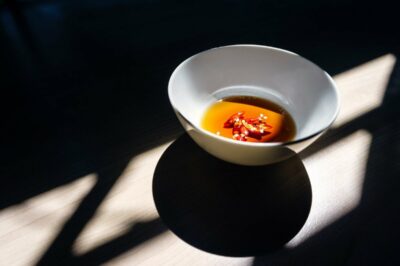Table of Contents[Hide][Show]
We’re excited by all of the holistic practices that are being studied, tried, and routinely utilized in our society. While massage, acupuncture, meditation are all very common natural remedies that are increasing in popularity, we are interested in delving deeply into those ancient practices that are a little more obscure, like tongue scraping. Have you heard about it?
The History
Whether you’re a tongue scraping expert or this is the first time you’ve even thought of the concept, the idea has been around for a long, long time. Tongue scraping is actually part of an ancient Ayurvedic text called the Charaka Samhita, where it is considered one way to remove Ama, or toxic debris, from your mouth.
Although Eastern civilizations have historically placed significant value on tongue scraping, the Western civilization is slower to accept this as a beneficial addition to your health regimen. Between the 15th and 19th century, tongue cleaning, like many other less rudimentary hygiene habits, was reserved for the affluent. It wasn’t until the 20th century that tongue scraping became popularized and a commercial market rose for the sell of the scrapers.
Even more recently, the benefits are becoming more well-known, widespread and thus, the practice is generally growing in popularity.
The Benefits of Tongue Scraping
In Ayurveda, the oral cavity is considered to be one of the main passages between your body and the environment so maintaining proper oral hygiene helps create balance and an overall general wellness. Because the tongue is a conducive environment for bacteria to thrive, particularly the region towards the back of your mouth, it’s less than ideal for your tongue to serve as a five-star accommodation for bacteria.
Tongue scraping helps manage the balance between a healthy mouth and healthy you because of these benefits:
- Cleans toxins and bacteria from the tongue
- Helps remove coating on the tongue that leads to embarrassing halitosis (bad breath)
- Helps eliminate undigested food particles from the tongue
- Cleans the taste buds to enhance the sense of taste
- Promotes overall oral and digestive physical well-being
- Gently stimulates the internal organs
That’s a significant list of benefits for a minute of your morning time!
What is Ayurvedic Medicine? (Plus, Tips to Keep You Balanced)
Ancient Beauty Rituals: They Did it First
Watch Our Team Get a Ghee Eye Bath and Learn Why You Should, Too
What Type of Tongue Scraper Should I Buy?
The purchase of a tongue scraper is largely going to come down to individual preference so there are a couple of things to consider. Though tongue scrapers have been made out of everything from whalebone to plastic, in the traditional Ayurvedic practice, they are made from copper, silver, gold, tin or brass. Stainless steel tends to be a popular metal choice because it contains less allergens, is easy to clean and very durable.
Picking a size that is right for your mouth will obviously improve comfort. They are most beneficial if they are the width of your tongue and not too narrow. Ideally you should be able to scrape the entire tongue in one motion. Additionally, like a keyboard or nice pen, you’re going to want to find one that is a comfortable fit for your hands. For example, you might prefer a handle that is grasped in one hand while someone else may favor the two-handled, two-handed type.
They tend to be pretty inexpensive so you can experiment until you find one that meets your needs.
How to Use It
You’ve scoured local stores and searched the Interwebs… Success! You found your perfect tongue scraper. Great job! Now what?
Begin working your tongue scraping into your daily AM routine. Might I suggest a morning time oral hygiene playlist to set the mood? It’s largely agreed that you should do your tongue scraping early in the morning on an empty stomach. However, there is some debate over order of operations; should you brush your teeth or scrape your tongue first? With no clear answer or consensus, the choice is yours!
Extend your tongue as far as it will go—really channel your inner Gene Simmons here—then place the scraper as far back on your tongue as is comfortable. Gently pull the tongue scraper across the entire surface of the tongue in one forward motion. Rinse the tongue scraper and repeat until you no longer remove unwanted coating (usually around 5-10 times). Be careful not to scrape your tongue overzealously as this can temporarily damage your taste buds! And then what good is that chocolate cake you’ve been saving?








Hi! I just wanted to add that it works best if you scrape your tongue before you drink anything and before you brush your teeth. Toxins rise to the top of your tongue overnight, so if you were to drink water you would just be drinking your toxins back into your system.